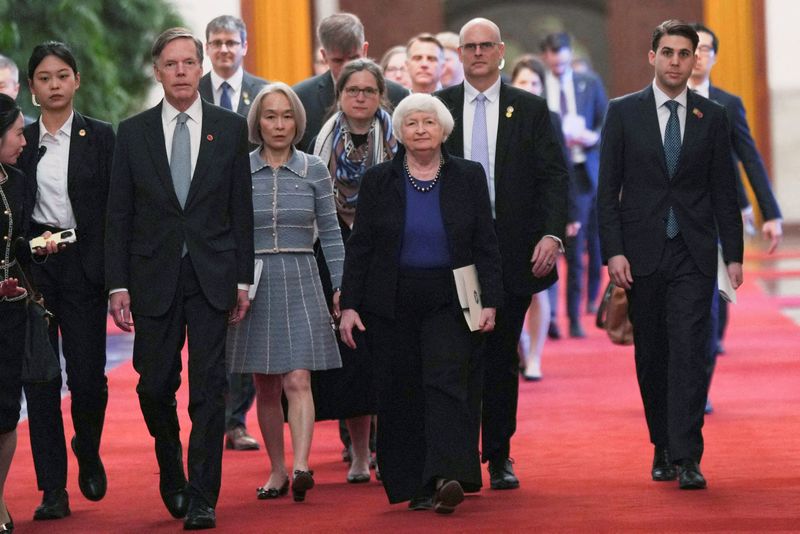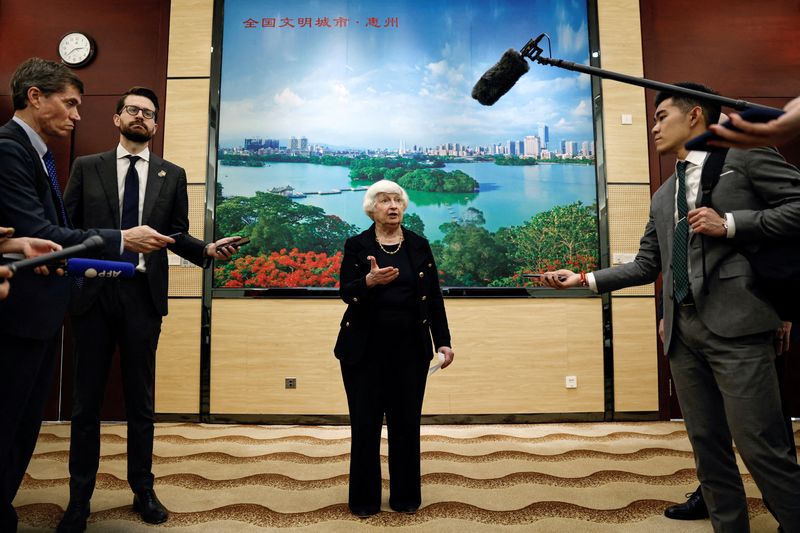By David Lawder
BEIJING (Reuters) -U.S. Treasury Secretary Janet Yellen on Sunday raised her concerns about China's excess industrial capacity with Chinese Premier Li Qiang, telling him that bilateral relations were now more stable because the two sides can have "tough" discussions.
As they began a meeting in Beijing that ran 80 minutes, Li responded that the two countries needed to respect each other and should be partners, not adversaries, adding that "constructive progress" had been made during Yellen's trip.
Yellen said Washington and Beijing had a "duty" to responsibly manage the complex relationship,
"While we have more to do, I believe that, over the past year, we have put our bilateral relationship on more stable footing," Yellen said. "This has not meant ignoring our differences or avoiding tough conversations. It has meant understanding that we can only make progress if we directly and openly communicate with one another."
Yellen has made the threat that China's over-production of electric vehicles (EVs), solar panels and other clean energy goods will hurt producers and jobs in the U.S. and other countries a focus of her second visit to China in nine months.
A senior U.S. Treasury official said later that China's excess industrial capacity and the government support that has fueled it were discussed at length during the meeting and Li showed some willingness to have U.S. and Chinese economic teams explore the issue further.
Although there were some differences of opinion, "there was not ideological or inflammatory pushback," the official said. "It was a much more legitimate conversation of policymakers."
State news agency Xinhua on Sunday quoted Li saying the U.S. should "refrain from turning economic and trade issues into political or security issues" and view the issue of production capacity from a market-oriented and global perspective".
The development of China's clean energy sector, where overcapacity concerns are felt most acutely, will support the global energy transition, Xinhua quoted Li as saying.
WARM WELCOME
Following her meeting with Li, Yellen met with Beijing mayor Yin Yong and attended events at the elite Peking University, where students gave her a standing ovation.
Yellen has received a warm welcome on her second trip to China in nine months, which featured several social and cultural events, including a Pearl River boat cruise in Guangzhou and a private, after-hours tour of Beijing's Forbidden City.
Her first visit in July 2023 was all business as she sought to normalise bilateral economic relations after a period of heightened tension caused by differences over issues ranging from Taiwan to COVID-19's origins and trade disputes.
In a further sign of the ties stabilising, U.S. President Joe Biden and Chinese President Xi Jinping sought to manage tensions over the South China Sea in a nearly two-hour call on Tuesday, their first direct talks since a summit in November.
U.S. and Chinese military officials met in Hawaii last week for a series of rare meetings focused on operational safety and professionalism.
BALANCED GROWTH
On Saturday in Guangzhou, Yellen and her main economic counterpart, Vice Premier He Lifeng, agreed to launch a dialogue focused on "balanced growth". Yellen said she intends to use the forum to advocate for a level playing field with China to protect U.S. workers and businesses.
Beijing's support for battery-powered rides has helped homegrown companies such as BYD (SZ:002594) and Geely grab share in the world's biggest car market, and turn China into the world's largest auto exporter as production outpaces domestic demand.
The Economist Intelligence Unit forecasts China's battery manufacturing capacity will outpace demand by a factor of four by 2027, as its EV industry continues to grow.

But rapid growth has also meant China has created excess manufacturing capacity that could be between 5 and 10 million EVs per year, according to consultancy Automobility.
Still, far from curbing investment in manufacturing, China has doubled down on Xi's new mantra of unleashing "new productive forces" by investing in cutting-edge technology including EVs, commercial spaceflight and life sciences - areas where many U.S. firms hold advantages.
